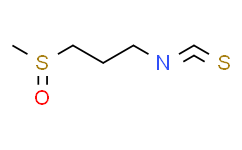| Cas No.: | 505-44-2 |
| Chemical Name: | Propane,1-isothiocyanato-3-(methylsulfinyl)- |
| Synonyms: | Propane,1-isothiocyanato-3-(methylsulfinyl)-;Iberin;1-ISOTHIOCYANATO-3-(METHYLSULFINYL)PROPANE;1-isothiocyanato-3-methylsulfinylpropane;IBERIN(RG);3-Methylsulfinylpropyl isothiocyanate;3-Methylsulphinylpropylisothiocyanate;C5H9NOS2;METHYLSULFINYLPROPYLISOTHIOCYANATE;sulfpraphane |
| SMILES: | O=S(CCCN=C=S)C |
| Formula: | C5H9NOs2 |
| M.Wt: | 163.26106 |
| Sotrage: | 2 years -20°C Powder, 2 weeks 4°C in DMSO, 6 months -80°C in DMSO |
| Description: | Iberin, a sulfoxide analogue of sulforaphane, is a naturally occurring member of isothiocyanate family. It inhibits cell survival with an IC50 of 2.3 μM in HL60 cell. |
| In Vivo: | Iberin is tested in an in vivo foreign-body infection mouse model, and the results show no significantly difference in bacterial clearance between treated and nontreated miced[4]. Iberin increases tissue levels of the phase II detoxification enzymes quinone reductase and glutathione S-transferase in a variety of rat tissues[5]. |
| In Vitro: | Iberin inhibits the growth of neuroblastoma cells in a dose- and time-dependent manner. The iberin-induced cell cycle arrest in neuroblastoma cells is associated with inhibition of expression of cyclin-dependent kinase Cdk2, Cdk4, and Cdk6 proteins. There is an increase in apoptotic cell death in iberin treated cells as compared with control cells. The iberin-induced apoptosis is found to be associated with activation of caspase-9, caspase-3, and PARP[2]. Iberin inhibits growth of human glioblastoma cells in cell proliferation assays, enhances cytotoxicity, and induces apoptosis by activation of caspase-3 and caspase-9[3]. |

 DC Chemicals' products qualify for U.S. tariff exemptions. We guarantee no price increases due to customs duties and maintain stable supply, continuing to deliver reliable research solutions to our American clients.
DC Chemicals' products qualify for U.S. tariff exemptions. We guarantee no price increases due to customs duties and maintain stable supply, continuing to deliver reliable research solutions to our American clients.





















